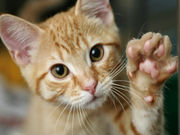Not uncommon for toddlers to ingest medications intended for dogs and cats
MONDAY, Feb. 6, 2017 (HealthDay News) — The flea medications and heartworm pills that millions of Americans give to their pets pose poisoning risks to any children in the home, according to research published online Feb. 6 in Pediatrics.
The study authors report that just one poison center in Ohio received 1,431 calls for poisoning from pet medications over the course of 15 years, with 87.6 percent of those calls involving children aged 5 and under.
The drugs associated with poisoning included veterinary products that have no human equivalent (17.3 percent), antimicrobials (14.8 percent), antiparasitics (14.6 percent), and analgesics to relieve pain (11.1 percent). Poisoning occurs in several ways, the researchers explained. Toddlers can pick up pills spit out by a pet or eat food containing medications left uneaten in a food bowl. Also, children who pet an animal being treated with a lotion or cream can get it on their hands and then put their hands into their mouths.
“The majority of exposures occurred at home [96 percent] and were not expected to result in long-term or long-lasting health effects,” coauthor Kristi Roberts, M.P.H., from the Center for Injury Research and Policy at Nationwide Children’s Hospital in Columbus, Ohio, told HealthDay. “However, some prescriptions, both human and veterinary, could be highly dangerous even at low dosages, especially for small children.” Although most poisonings were among toddlers, teenagers were also exposed to medications intended for pets, Roberts said. “Many teens mistakenly took pet medication instead of human medication,” she noted.
Full Text
Copyright © 2017 HealthDay. All rights reserved.








